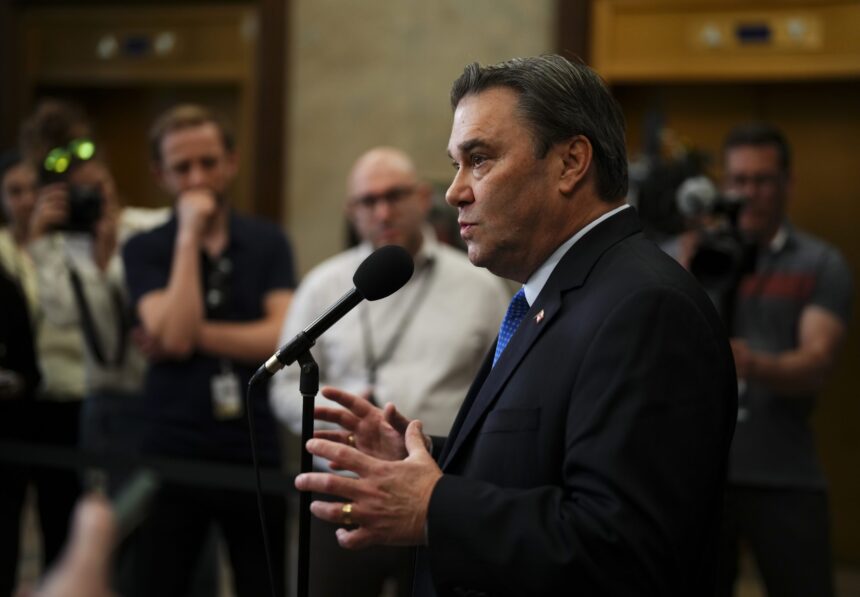Article – The numbers behind Jagmeet Singh’s electoral catastrophe don’t lie. Three hundred seventy-five days of being Justin Trudeau’s lifeline through the supply-and-confidence agreement has cost the NDP severely at the polls. After last month’s electoral bloodbath left the party with just 14 seats nationwide—down from 25 in 2021—Singh has finally announced a sweeping internal review to understand what exactly went so terribly wrong.
“We need to look at everything,” Singh told me during a phone interview yesterday, his voice noticeably stripped of its usual confidence. “Our message didn’t break through. We lost connection with people who’ve supported us for generations.”
I’ve covered six federal elections, and I’ve never seen the New Democrats in such disarray. The party that once held Official Opposition status under Jack Layton has been reduced to fourth-party standing, trailing the resurgent Bloc Québécois and watching helplessly as former orange strongholds flipped Conservative blue or Liberal red.
At NDP headquarters in Ottawa, staffers speak in hushed tones. The electoral map tells a devastating story: zero seats in Saskatchewan (the party’s birthplace), just two seats left in British Columbia (down from 11), and total obliteration in urban Toronto where progressives abandoned the party in droves.
Peter Julian, one of the few surviving NDP MPs, has been tapped to co-chair the review committee alongside former Saskatchewan NDP leader Carla Beck. “This isn’t just about examining campaign tactics,” Julian explained when I caught him between committee meetings on Parliament Hill. “We’re questioning our fundamental relationship with Canadians. What do we stand for in their eyes?”
Elections Canada data suggests the party’s popular vote collapsed to 11.2 percent—their worst showing since 2004. More troubling for the party faithful: exit polling conducted by Abacus Data revealed that 72 percent of former NDP voters who switched parties cited the supply-and-confidence agreement with the Liberals as a primary factor.
“They became Liberal enablers without getting anything substantial in return,” said Christo Aivalis, a political historian at Queen’s University who studies left-wing movements in Canada. “The dental care program was half-implemented, pharmacare was watered down, and housing affordability got worse. Working-class voters couldn’t distinguish what the NDP actually delivered.”
The review committee will examine several painful questions. Did the party compromise too much? Was Singh’s leadership style too accommodating toward Trudeau? And perhaps most critically: has the NDP lost its identity as Canada’s conscience on the political left?
Charlie Angus, the longtime NDP MP who lost his northern Ontario seat after holding it for over two decades, didn’t mince words when I visited his nearly-emptied constituency office in Timmins.
“We stopped being fighters,” Angus said, gesturing toward the boxes of constituency files being packed away. “When people are struggling with groceries, gas, and housing, they want champions, not partners in a parliamentary dance with the Liberals.”
The review faces several structural challenges beyond the supply deal. Internal party documents I’ve reviewed show fundraising dropped 31 percent during the agreement period. The party’s $10 million campaign war chest proved inadequate against the Conservative machine that mobilized $27 million for their winning effort.
In British Columbia’s Lower Mainland, where the NDP lost five previously safe seats, the story becomes even more complicated. Jenny Kwan, who narrowly held Vancouver East, told me local organizers couldn’t overcome housing affordability frustrations.
“People kept asking why we were propping up a government that wasn’t delivering real housing solutions,” Kwan said. “We had good policies, but the agreement overshadowed everything else.”
The collapse in Quebec presents another existential threat. The party that once held 59 seats in the province under Layton’s 2011 “Orange Wave” has been reduced to a single Montreal riding. Alexandre Boulerice, now the lone Quebec New Democrat in Parliament, believes the party lost its distinct voice.
“Quebecers want a party that stands on principle,” Boulerice said during our meeting at a Saint-Henri café. “Being seen as Trudeau’s junior partner killed our credibility as an alternative.”
Singh has ruled out resigning despite the historic defeat, though multiple sources within the party’s federal council tell me pressure is mounting. The NDP constitution requires a leadership review vote after each election, and preliminary numbers suggest Singh could face an uphill battle to retain leadership.
“The party is split between those who want dramatic reinvention and others who believe we just need better messaging,” said a senior NDP strategist who requested anonymity to speak candidly. “But everyone agrees we can’t continue as we have been.”
The post-mortem has broader implications for Canadian politics. With the Conservatives now holding a comfortable majority government under Pierre Poilievre and the Liberals searching for Trudeau’s replacement, the progressive vote faces potential fragmentation between the Liberals, NDP, and Greens.
“The risk is that progressive politics becomes completely marginalized,” warned Avi Lewis, documentary filmmaker and one-time NDP candidate. “The left needs a credible vehicle that speaks authentically about economic justice, climate action, and Indigenous reconciliation.”
For Singh, who staked his leadership on the controversial supply deal, the review represents both professional reckoning and personal reflection.
“We thought we were putting people first by getting dental care and pharmacare started,” Singh admitted during our conversation. “But voters clearly felt differently. We need to listen carefully now.”
The review committee will tour the country throughout the fall, with a final report expected by January 2026. Whether the once-mighty party of Tommy Douglas, Ed Broadbent and Jack Layton can rebuild remains the central question in progressive Canadian politics.
What’s clear after spending time with devastated NDP organizers across five provinces is that the soul-searching runs deeper than election tactics or leadership questions. It touches the very purpose of having a social democratic party in Canada’s political landscape.
As one longtime NDP volunteer in Hamilton put it while clearing out campaign office supplies: “We forgot who we were fighting for. We can’t make that mistake again.”






